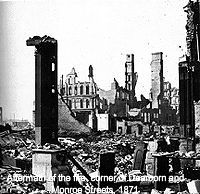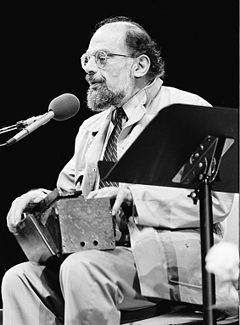“Punting the Pundits” is an Open Thread. It is a selection of editorials and opinions from around the news medium and the internet blogs. The intent is to provide a forum for your reactions and opinions, not just to the opinions presented, but to what ever you find important.
Thanks to ek hornbeck, click on the link and you can access all the past “Punting the Pundits”.
Sen. Bernie Sanders: Rein in Wall Street and Rescue the Middle Class
It’s time for us to end the financial oligarchy so destructive to our economy. If a bank is too big to fail, it is too big to exist
The protest movement called Occupy Wall Street has struck a nerve. The demonstrators’ goals may be vague but their grievances are very real. If our country is to break out of this horrendous recession and create the millions of jobs we desperately need, if we are going to create a financially-stable future, we must take a hard look at Wall Street and demand fundamental reforms. I hope the protesters provide the spark that ignites that process.
The truth is that millions of Americans lost their jobs, their homes and their life savings because of the greed, recklessness and illegal behavior of Wall Street. Even Federal Reserve Chairman Ben Bernanke agreed when I questioned him this week at a joint economic committee hearing that that there was “excessive risk-taking” by Wall Street. Bernanke also said the protesters “with some justification” hold the financial sector responsible for “getting us into this mess”, and added, “I can’t blame them.”
Malalai Joya: Message on the Tenth Anniversary of NATO’s War and the Occupation of Afghanistan
I would like to thank all supporters and anti-war movements around the world who are marking the dark day of occupation of U.S. and NATO in Afghanistan.
Respected friends – 10 years ago the U.S. and NATO invaded my country under the fake banners of women’s rights, human rights, and democracy. But after a decade, Afghanistan still remains the most uncivil, most corrupt, and most war torn country in the world. The consequences of the so-called war on terror has only been more bloodshed, crimes, barbarism, human rights, and women’s rights violations, which has doubled the miseries and sorrows of our people.
During these bloody years, tens of thousands of innocent civilians have been killed by occupation forces and terrorist groups. When Barack Obama took office in 2008, unfortunately his first news for my people was more conflict and more war. It was during Obama’s administration that civilian death tolls increased by 24%. And the result of the surge of troops of Obama’s administration is more massacres, more crimes, violence, destruction, pain, and tragedy. That’s why he has proved himself as a warmonger — as second even more dangerous Bush.
The “Occupy Wall Street” movement’s political breakthrough came Wednesday as leaders of the Congressional Progressive Caucus and the Congressional Black Caucus joined Sen. Bernie Sanders, I-Vt., in endorsing the burgeoning national challenge to corporate greed and corrupt politics.
On a day that saw thousands of union members, community activists and supporters of New York’s Working Families Party rally in solidarity with the New York protests, Congressman John Larson, the Connecticut Democrat who is the fourth-ranking member of the party’s House Caucus, announced, “The silent masses aren’t so silent anymore.”
Of the demonstrators, Larson said, “They are fighting to give voice to the struggles that everyday Americans are going through.”
Not surprisingly, it was Sanders who offered the most full-throated support of the movement. At the Campaign for America’s Future “Take Back America” conference, he declared: “We have the ‘crooks’ on Wall Street, and I use that word advisedly – don’t misquote me, the word is ‘crooks’ – whose greed, whose recklessness, whose illegal behavior caused this terrible recession with so much suffering. We believe in this country; we love this country; and we will be damned if we’re going to see a handful of robber barons control the future of this country.”
Robert Naiman: We, the 99%, Demand the End of the Wars Now
After ten years of war, now is a perfect time to act to end the wars in Iraq and Afghanistan. The Friends Committee on National Legislation has set up a toll-free number for us to call Congress: 1-877-429-0678. A Congressional “Supercommittee” is charged with coming up with $1.5 trillion in reduced debt over ten years, and the wars and the bloated Pentagon budget dangle before the Supercommittee like overripe fruit.
A recent CBS poll shows how far out of step with the 99% the Pentagon’s plans are. 62% want U.S. troops out within two years.
But the Pentagon wants to stay for at least thirteen more years.
So what else is new, you may say. The Pentagon wants to stay everywhere forever.
But here is a key political fact about the world in which we live: the Pentagon does not always get what it wants. The Pentagon did not want to eat a timetable for the withdrawal of all Pentagon forces from Iraq by December, but the Pentagon was forced to eat such a timetable anyway. Now, the Pentagon is trying to undo the timetable. But it is far from clear that the Pentagon will succeed. Already it has been forced to lower its sights to seeking to keep a force of no more than 5000 “trainers.” But even that lowered aspiration may well fail. The Iraqi government has said that it’s fine if thousands of “trainers” stay – as long as they don’t have immunity from Iraqi law. But the U.S. government says that’s a red line: in order to stay, the “trainers” must have immunity from Iraqi law. So less than three months before all Pentagon forces are supposed to leave Iraq, there is no deal. There well might never be a deal, and all Pentagon forces may well come out on schedule.
Dean Baker: Steve Jobs and Alan Greenspan
On the tragic passing of Steve Jobs, while still a relatively young man, it is interesting to juxtapose him to Alan Greenspan, one of the other iconic figures of our time. One made us rich, with a vast array of new products and new possibilities. The other made us poor with a long lasting downturn that could persist for more than a decade.
The two of them can be taken as symbols for the best and worst of modern capitalism. Jobs is the symbol of capitalism when it works. Again and again he broke through barriers, creating new products that qualitatively altered the market by making vast improvements over the competition.
Apple made personal computers a standard household product by developing a simple user friendly idiot-proof system that anyone could use. Jobs was a decade ahead of the Microsoft based systems, using menu driven computers in the mid-80s that were not matched by Microsoft until Windows was developed in the mid-90s. His later generation of computers continues to include features that make it far superior to the competition.
Bill Quigley: Report from Haiti: Where’s the Money?
Broken and collapsed buildings remain in every neighborhood. Men pull oxcarts by hand through the street. Women carry 5 gallon plastic jugs of water on their heads, dipped from manhole covers in the street. Hundreds of thousands remain in grey sheet and tarp covered shelters in big public parks, in between houses and in any small pocket of land. Most of the people are unemployed or selling mangoes or food on the side of every main street. This was Port au Prince during my visit with a human rights delegation of School of Americas Watch – more than a year and a half after the earthquake that killed hundreds of thousands and made two million homeless.
What I did not see this week were bulldozers scooping up the mountains of concrete remaining from last January’s earthquake. No cranes lifting metal beams up to create new buildings. No public works projects. No housing developments. No public food or public water distribution centers.
Everywhere I went, the people of Haiti asked, “Where is the money the world promised Haitians?”



 The first feature-length motion picture with synchronized dialogue sequences, its release heralded the commercial ascendance of the “talkies” and the decline of the silent film era. Produced by Warner Bros. with its Vitaphone sound-on-disc system, the movie stars Al Jolson, who performs six songs. Directed by Alan Crosland, it is based on a play by Samson Raphaelson.
The first feature-length motion picture with synchronized dialogue sequences, its release heralded the commercial ascendance of the “talkies” and the decline of the silent film era. Produced by Warner Bros. with its Vitaphone sound-on-disc system, the movie stars Al Jolson, who performs six songs. Directed by Alan Crosland, it is based on a play by Samson Raphaelson.
 The Orient Express is the name of a long-distance passenger train, the route for which has changed considerably in modern times. The first run of The Orient Express was on 4 October 1883. The train travelled from Paris to Giurgiu in Romania, via Munich and Vienna. At Giurgiu, passengers were ferried across the Danube to Ruse in Bulgaria to pick up another train to Varna. From here they completed their journey to Istanbul by ferry.
The Orient Express is the name of a long-distance passenger train, the route for which has changed considerably in modern times. The first run of The Orient Express was on 4 October 1883. The train travelled from Paris to Giurgiu in Romania, via Munich and Vienna. At Giurgiu, passengers were ferried across the Danube to Ruse in Bulgaria to pick up another train to Varna. From here they completed their journey to Istanbul by ferry.
Recent Comments